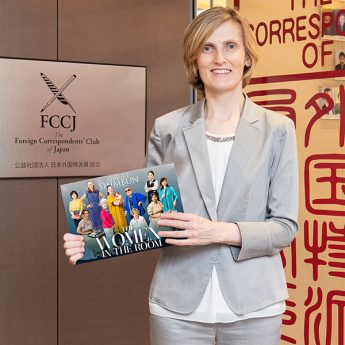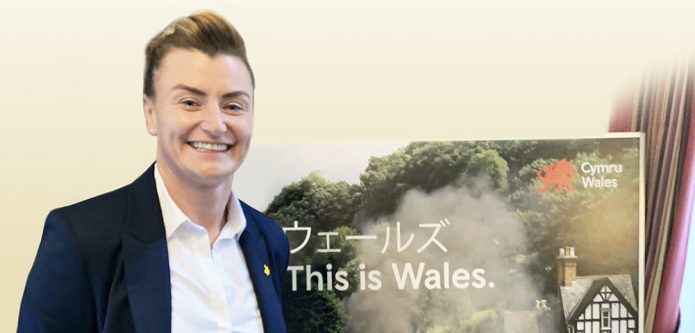As global ambassador to Western Japan for the International Gay & Lesbian Travel Association (IGLTA), I have been heavily involved over the past few years in the development of Lesbian, Gay, Bisexual and Transgender (LGBT) tourism in Japan.
Using my 20 years’ experience in the hospitality industry and my management background in hotel and restaurant operations, sales and marketing, I have been working steadfastly to increase the membership of the IGLTA.
A leading member-based global organisation dedicated to LGBT tourism, in Japan the IGLTA has only 18 members, which may seem a low figure. However, the membership has grown substantially over the past three years, before which there were just four Japanese members. And the number continues to increase.
Meanwhile, representing the UK there are 22 member organisations, including VisitBritain and World Travel Market, the latter an annual B2B event held in London for the global travel industry. In contrast, the Japanese members are all private firms. Thus, in order to attract more LGBT travellers, Japan needs greater cooperation from local and national tourism offices.
Although the Hotel Granvia Kyoto in 2006 became the first Japanese firm to join IGLTA, we did not aggressively reach out to the market at that time. It was not until I first participated in an IGLTA annual conference in Chicago in 2013 that I saw there had been significant growth in global LGBT tourism.
While most of the attendees were promoting travel packages tailored to LGBT travellers, such as gay cruises or special offers for gay pride events, Japanese hotels, including us, did not have any such special offers.
I realised then that we needed to take concrete steps immediately in this direction. To this end, I held LGBT meetings for staff, created a same-sex wedding package, and published a press release at the global travel trade show ITB Berlin in March 2014.
That press release about our same-sex wedding package shocked the world; many international media organisations wrote about it. Japanese media soon followed suit, running reports in major newspapers and travel magazines, as well as on TV news. It was at that time that the discussion of legalising same-sex marriage in Japan began to heat up. We have seen the legalisation of same-sex marriage in Great Britain in 2014 and in the United States in June this year.
In Japan, despite same-sex marriage not being legal, more hotels and wedding venues have announced that they can offer same-sex weddings—and those numbers are growing. Compared with three years ago, there has been a huge change. Thus I believe that our efforts have had some effect on Japanese society, and have gone on to trigger changes in other firms.
Japan is a popular travel destination, but not particularly known as an LGBT-friendly one. While Tokyo’s Shinjuku ni-chome, in particular, is quite well known as the biggest LGBT-friendly area in Japan, many people still think that Japan is too conservative to be an LGBT-friendly destination. However, I believe that is mostly because Japan has not been promoted as such; certainly, LGBT travellers are welcomed almost everywhere.
It is important that firms and organisations visibly show both guests and employees they are LGBT friendly. All our concierge staff wear the IGLTA rainbow pin badge on their uniform, and a rainbow sticker can be found on many computers, desks or workspaces in the back office.
While none of the staff are forced to wear the pin or use the sticker, after several meetings about LGBT and having gained a deeper understanding of LGBT tourism, they may do so in order to make a contribution to creating an LGBT-friendly work environment. It may seem a small step, but we are definitely moving forward.
The Japan Tourism Agency set a goal of welcoming 20mn visitors to Japan by 2020. In order to reach this goal, we all have to recognise the importance of LGBT tourism.
To date, Japan’s problem has been that the LGBT issue was not on the table; in fact the acronym LGBT was not generally known. However, there has been significant change over the past few years, with several non-profit organisations now supporting marriage equality and holding lectures and meetings around the nation.
There were over 55,000 participants in Tokyo Rainbow Pride in April, a record in the event’s history.
In addition, Japanese politicans, including members of the Liberal Democratic Party of Japan and the Democratic Party of Japan, have established a non-partisan group to rid Japan of discrimination against sexual minorities.
In legal terms, Tokyo’s Shibuya Ward took a big step forward in certifying same-sex partnerships in April, and other cities have started discussing LGBT rights. The Legal Network for LGBT Rights submitted a petition to the Japan Federation of Bar Associations asking for the legalisation of same-sex marriage and an end to violations of equal rights, as guaranteed under Japan’s constitution.
One of the three concepts for the Tokyo 2020 Olympic and Paralympic Games is “Accepting one another (unity in diversity)”. The movement for LGBT rights in Japan is gathering momentum: a small stream will become a great river, with the outflow benefitting the greater good. There might be some obstacles ahead, but I believe the day will soon come when Japan will fully embrace diversity in this area.






